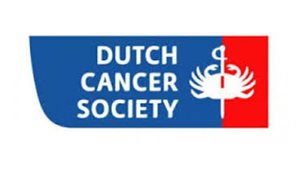
Research projects:

Research project: CAIX-targeted alpha therapy for tumor specific radiation of metastatic clear cell renal cell carcinoma.
Sandra Heskamp, theme Rare cancers, RIMLS
Approved budget: € 662,447
Kidney cancer is an aggressive form of cancer that is difficult to treat with conventional medicine such as chemotherapy. Sandra Heskamp will develop new therapies to improve the rate of survival for kidney cancer patients. In this project, she will work on a new type of radionuclide therapy with alpha particles. She will link a radioactive substance to an antibody that specifically binds to the kidney cancer cells, but not to healthy cells. This makes it possible to apply a high dosage of radioactive radiation to the tumor and any metastases, with the normal tissue being spared. The alpha particles that are used in this project can do substantial damage to cancer cells, even at a low dosage, with a very limited chance of their recovery or survival. In the coming years, she will examine whether it is possible to effectively and safely use this therapy in the treatment of people with kidney cancer. This project will be funded by Alpe d’HuZes.

Research project: Tumor deposits: the cause of metastases.
Iris Nagtegaal, theme Tumors of the digestive tract, RIMLS
Approved budget: € 705,333
Iris Nagtegaal focuses her research on cancer metastasis. The current theory is that the disease spreads through the body via the lymph nodes, but is that actually the case? Distribution via the blood vessels appears to be more important. Additionally, a large proportion of colon cancer cases show separate groups of cancer cells near the tumor: the tumor depositions. The presence of tumor depositions is associated with a poor prognosis, and would perhaps be a better indicator for prescribing chemotherapy than positive lymph nodes. However, little is known about tumor depositions. With this funding, Iris Nagtegaal aims to try and establish a definition for tumor depositions. How do the cells end up in the adipose tissue? Do they come from the blood vessels, or from the lymph as suspected? And what is the best treatment for colon tumors with tumor depositions?
Unique high-risk project:

Research project: Into the light: guided visualization of high-risk cancer precursor lesions.
Annemarie Boleij, theme Tumors of the digestive tract, RIMLS
Approved budget: € 167,112
Annemarie Boleij’s research will focus on early detection of colon cancer. At the moment, early signs of colon cancer are regularly missed during a colonoscopy. This is because some of them are flat, and are therefore harder to find (sessile tumors). These sessile tumors are more prevalent on the right side, and carry a particularly high risk; if they remain, they can quickly grow into an aggressive cancer. By detecting the presence of certain microorganisms on polyps, bacterial biofilms, the expectation is that the visual markers for early signs of colon tumors will be better recognisable. This means that patients can be treated at an earlier stage. The funding awarded to Annemarie Boleij comes directly from the proceeds of the Alpe d’HuZes.
Infrastructure Initiative:

Research project: Overcoming practical, motivational and technical challenges in building a sustainable biomarker validation infrastructure for early detection of (breast) cancer.
Mireille Broeders, theme Women's cancers, RIHS
Approved budget: € 406,735
Mireille Broeders and Jennifer Lutomski will receive funding to build an infrastructure in the Radboud university medical center Biobank. This infrastructure will make it possible for the other researchers to examine the value of biomarkers (such as cell-free plasma DNA) for the early detection of breast cancer and other types of cancer. For this type of research, large-scale studies are required in which information about risk factors are collected before the cancer is diagnosed. In the future, the infrastructure will allow other researchers to request data from the Personalized Risk-based Mammascreening (PRISMA) study. The study has collected the risk factors and mammograms of over 43,000 women who participated in the population screening for breast cancer. Over 10,000 women also provided biomaterials (DNA, plasma, serum). The PRISMA participants are asked to extend their consent to include scientific research. The infrastructure will be designed in such a way that sharing data is done in a responsible and user-friendly manner.
Implementation project:

Research project: Tumor-First-workflow: Nationwide Implementation of Ovarian Cancer Heredity Prescreening, to stratify both Genetic Testing and Treatment Options.
Nicoline Hoogerbrugge, theme Tumors of the digestive tract, RIMLS
Approved budget: € 750,822
Nicoline Hoogerbrugge, together with Marjolijn Ligtenberg and Joanne de Hullu, will receive funding for the national implementation of the new method for identifying a hereditary form of ovarian cancer in women. This is done by testing each new patient’s tumor for genetic anomalies first. Using this method means that not every patient requires a blood test, it will only be necessary when an anomaly is found (in about 20% of the cases). If no anomalies are found, there is no genetic predisposition, and there is no need for a blood test. The test makes it possible to efficiently determine whether the tumor is hereditary, which will enable the prevention or early detection of breast cancer or ovarian cancer in female relatives.
Read more about the projects (only available in Dutch).
Related news items

Exploration meeting Academic Alliance on Oncology
2 December 2019 Within the Academic Alliance, the Maastricht UMC+ and Radboudumc are already working together in several areas. And this is happening in more and more fields. On 27 November researchers from both umc's met during the fourth Exploration meeting, this time with the theme: Oncology. read more
KWF Roadshow 11 November 2019
10 October 2019 In which way(s) can KWF provide optimal support to oncological research and care? How can we maximize impact on our investments? These questions are pivotal in Ambition 2030: the vision that KWF developed in close cooperation with stakeholders in the oncological field. read more
Bart Kiemeney finishes 1st in the Tour and raises thousands of euros
30 July 2019 With over €47,000 on the counter, Kiemeney can see the Tour de France as a great success. read more
Internal KWF review procedure 2020
13 June 2019 In agreement with the existing policy the research board and Radboud Center for Oncology have decided to continue with the mandatory internal review procedure for KWF grant applications. read more
Universal tumor BRCA1/2 testing of ovarian cancer
13 May 2019 Marjolijn Ligtenberg, Janet Vos and Nicoline Hoogerbrugge, assessed the feasibility of a workflow for universal tumor DNA BRCA1/2 testing of all newly diagnosed OC patients as prescreen for PARPi treatment and cancer predisposition testing. They have published their findings in the JNCI. read more
